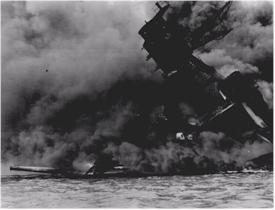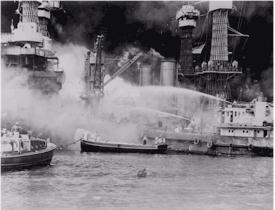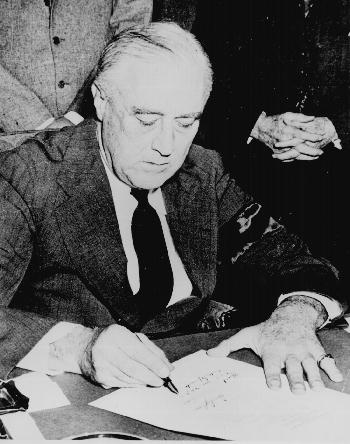
THE ASSOCIATED PRESS/LUCY PEMONI
Woody Derby, 85, of San Diego salutes on Friday in
Honolulu. He was working in the supply room on the
USS Nevada when the Japanese attacked Pearl Harbor
62 years ago today.
Posted on 12/07/2003 1:56:59 PM PST by Dubya
PEARL HARBOR, Hawaii - Woody Derby was just 23, a farm boy from Iowa enjoying his Sunday newspaper, when his life -- and the nation -- changed forever.
Sixty-two years after that haunting Dec. 7 at Pearl Harbor, thoughts of the Japanese attack that killed 2,390 people are not far off for Derby, nor are they for a nation that has seen more dismal days, fought in more wars, lost thousands more sons and daughters.
Americans keep coming back to remember.
"Why do you think?" asked Derby, 85. "It's the worst military defeat the U.S. has ever had."
On Dec. 7, 1941, Japanese forces attacked American and British territories and possessions in the Pacific, including the home base of the U.S. Pacific Fleet at Pearl Harbor.
Hundreds are expected to gather today at the USS Arizona National Memorial to mark the 62nd anniversary of the surprise attack that launched the United States into World War II.
About 1.4 million people visit the site each year -- some paying homage by tossing flowers into the waters from the memorial above the sunken USS Arizona.
Derby worked in the supply room aboard the USS Nevada when the ship was attacked.
He remembers the sounds of the bombing, the gushing water that flooded his ship, the fellow sailors lost.
The crew of the USS O'Kane, who served in the war in Iraq this year, will also honor the Arizona, which lost 1,177 crew members, most of whom are still entombed in the sunken battleship.
"It kind of makes you stop and think about what people have done for us to be free the way we are," said Jan Winn, 62, of Redlands, Calif. "It makes you hope we don't have to go through it again."
Larry Solomon, of Lexington, Ky., said he listened during his flight to Hawaii as two young girls discussed Pearl Harbor.
One of the girls shrugged off the trip, saying it was a place where "just a bunch of people got bombed," Solomon recalled.
The other, he said, seemed to understand the importance of visiting the site.
"You've got to go," Solomon recalled the girl saying. "You've got to be a part of history."

THE ASSOCIATED PRESS/LUCY PEMONI
Woody Derby, 85, of San Diego salutes on Friday in
Honolulu. He was working in the supply room on the
USS Nevada when the Japanese attacked Pearl Harbor
62 years ago today.


Pearl Harbor Survivors Gather for Service 44 minutes ago Add U.S. National - AP to My Yahoo!
By MATT SEDENSKY, Associated Press Writer
PEARL HARBOR, Hawaii - With a giant American flag waving at half-staff under a cloudy sky, an aging and dwindling group of Pearl Harbor survivors gathered Sunday to commemorate the Japanese attack that launched the United States into World War II 62 years ago.
The generations that have passed since Dec. 7, 1941 have softened the pain but not eroded memories, the survivors said in a service at the USS Arizona Memorial.
"I'm getting too old to have feelings," said Leo Fitzek, 91, who was a radio operator on Ford Island, next to the harbor's Battleship Row, at the time of the attack.
About 250 people gathered on the memorial for the ceremony that began 62 years to the minute after the attack started.
Representatives of veterans and military groups dropped anthuriums and plumerias onto the water in an open well in the memorial, as the 18-foot flag waved at half-staff.
"The actions of those enemies may forever live in infamy," said Adm. Thomas Fargo, commander of U.S. forces in the Pacific. "But the valor of our citizens lives more boldly in our history."
The Arizona, which sank at its mooring along Battleship Row after a bomb ripped it open, remains a tomb for most of the 1,177 crewmen who were killed. The USS Arizona Memorial spans the hull of the battleship that sank in just nine minutes during the attack.
"You always remember," said William Cope, 90, who was a B-17 pilot at Hickam Air Force Base during the attack.
The surprise attack on Pearl Harbor and other military bases on Oahu lasted two hours. Twenty-one ships were heavily damaged, and 320 aircraft were damaged or destroyed. In all, 2,388 people were killed and 1,177 were wounded.
On the other side of the harbor, hundreds gathered at another service, which included a speech by Ernest Borgnine, the Oscar-winning actor whose role in "From Here to Eternity" won him the invitation to the service that was titled "Hollywood Remembers Pearl Harbor."
In separate ceremonies Sunday, two men who were aboard ships in Pearl Harbor at the time of the attack were being buried at sea.
Elsewhere across the country, veterans groups planned candlelight ceremonies in New York, Chicago and Atlanta to honor Pearl Harbor victims.
This year's rather subdued observances were similar to those last year, but were far different from 2001, when the 60th anniversary and its parallels with the Sept. 11 terrorist attacks drew thousands to Hawaii.

Aboard a Japanese carrier before the attack on Pearl Harbor, crew members cheer departing pilots.

A photo taken from a Japanese plane during the attack shows vulnerable American battleships, and in the distance, smoke rising from Hickam Airfield where 35 men having breakfast in the mess hall were killed after a direct bomb hit.

The USS Shaw explodes during the Japanese air raid.

The battleship USS Arizona after a bomb penetrated into the forward magazine causing massive explosions and killing 1,104 men. Dousing the flames on the battleship USS West Virginia, which survived and was rebuilt.

The battleship USS Arizona after a bomb penetrated into the forward magazine causing massive explosions and killing 1,104 men.

U.S. President Franklin D. Roosevelt signs the declaration of war against Japan, December 8, 1941.
Mr. Vice President, Mr. Speaker, members of the Senate and the House of Representatives:
Yesterday, December 7, 1941 - a date which will live in infamy - the United States of America was suddenly and deliberately attacked by naval and air forces of the Empire of Japan.
The United States was at peace with that nation, and, at the solicitation of Japan, was still in conversation with its government and its Emperor looking toward the maintenance of peace in the Pacific.
Indeed, one hour after Japanese air squadrons had commenced bombing in the American island Oahu, the Japanese Ambassador to the United States and his colleague delivered to our Secretary of State a formal reply to a recent American message. And, while this reply stated that it seemed useless to continue the existing diplomatic negotiations, it contained no threat or hint of war or of armed attack.
It will be recorded that the distance of Hawaii from Japan makes it obvious that the attack was deliberately planned many days or even weeks ago. During the intervening time the Japanese Government has deliberately sought to deceive the United States by false statements and expressions of hope for continued peace.
The attack yesterday on the Hawaiian Islands has caused severe damage to American naval and military forces. I regret to tell you that very many American lives have been lost. In addition, American ships have been reported torpedoed on the high seas between San Francisco and Honolulu.
Yesterday the Japanese Government also launched an attack against Malaya.
Last night Japanese forces attacked Hong Kong.
Last night Japanese forces attacked Guam.
Last night Japanese forces attacked the Philippine Islands.
Last night the Japanese attacked Wake Island.
And this morning the Japanese attacked Midway Island.
Japan has therefore undertaken a surprise offensive extending throughout the Pacific area. The facts of yesterday and today speak for themselves. The people of the United States have already formed their opinions and well understand the implications to the very life and safety of our nation.
As Commander-in-Chief of the Army and Navy I have directed that all measures be taken for our defense, that always will our whole nation remember the character of the onslaught against us.
No matter how long it may take us to overcome this premeditated invasion, the American people, in their righteous might, will win through to absolute victory.
I believe that I interpret the will of the Congress and of the people when I assert that we will not only defend ourselves to the uttermost but will make it very certain that this form of treachery shall never again endanger us.
Hostilities exist. There is no blinking at the fact that our people, our territory and our interests are in grave danger.
With confidence in our armed forces, with the unbounding determination of our people, we will gain the inevitable triumph. So help us God.
I ask that the Congress declare that since the unprovoked and dastardly attack by Japan on Sunday, Dec. 7, 1941, a state of war has existed between the United States and the Japanese Empire.
One of his jobs was to defend an airfield against Japanese troops that had been pushed back into the jungle but had enough ammo, food and fight in them to stage banzai charges on the airfield. He also went out on patrols, finding the Japanese in their jungle lairs and rooting them out. Rough duty.
He was recommended for the Silver Star for an action in which he killed 13 Japanese in a slit trench. When he had had too much scotch one night, he told me about the engagement. He said the Japanese were starving, out of ammo and (uncharacteristically) trying to surrender. Apparently, their officers weren't around to remind them of the importance of death before dishonor.
My Dad, following standing orders, killed them all. Nothing but an execution. The usual thing in the Pacific war. He never forgot their faces, though.
The Silver Star recommendation was approved after the War, while he was an engineering student on the G.I. Bill. He refused it. Every so often, another letter would come, asking if he wanted to reconsider. According to my mother, the days those letters came were dark days.
Later in life, he did some reading about the Pacific War. It was obvious that we had been in a state of undeclared war with the Japanese long before Pearl Harbor, and that they way the run-up to the conflict was presented to the public was very different from the reality. He said he was too old, by then, to be bitter about things that had happened so long ago, but he was somewhat wiser. He said it had been a different time, when Americans believed their leaders without question.
He was proud of my military service, but skeptical about the Vietnam War.
He died in 1981.
Here's to Sergeant Charles Kennedy, 32nd Infantry Division, U.S. Army. I miss you, Dad.
Disclaimer: Opinions posted on Free Republic are those of the individual posters and do not necessarily represent the opinion of Free Republic or its management. All materials posted herein are protected by copyright law and the exemption for fair use of copyrighted works.